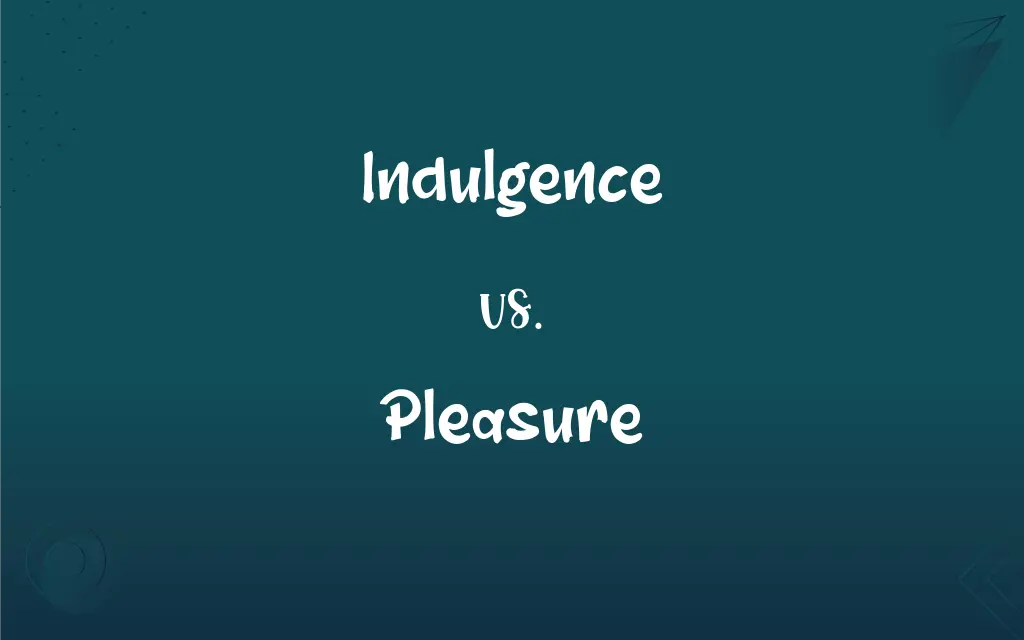Indulgence vs. Pleasure: What's the Difference?
Edited by Aimie Carlson || By Janet White || Updated on November 29, 2023
Indulgence is the act of gratifying desires excessively, while pleasure is the feeling of happiness or satisfaction.

Key Differences
Indulgence often implies over-gratification of desires, potentially leading to excess or harm, whereas pleasure is a broad term for any enjoyable emotion or sensation. Indulgence can be seen as a specific form of seeking pleasure, but not all pleasures are indulgent.
Indulgence may lead to guilt or negative consequences due to its excessive nature, whereas pleasure is generally a positive experience. Indulgence is about yielding to temptations, often beyond what is considered moderate, while pleasure can be experienced within the bounds of moderation.
Indulgence can be a deliberate choice to overstep boundaries for immediate gratification, while pleasure does not necessarily involve crossing boundaries. Indulgence is often associated with material or sensual pleasures, while pleasure encompasses a wider range of experiences, including emotional and intellectual satisfaction.
Indulgence is sometimes viewed negatively, as it can imply a lack of self-control, whereas pleasure is a natural and often beneficial aspect of human experience. Indulgence may result in diminishing returns of satisfaction over time, but pleasure can be a sustainable source of joy.
Indulgence can be an escape from reality or a coping mechanism, often driven by underlying needs or desires, while pleasure is an integral part of a balanced life, contributing to overall well-being without necessarily implying escape or excess.
ADVERTISEMENT
Comparison Chart
Nature
Excessive gratification of desires
General feeling of happiness
Connotation
Often negative, implies excess
Usually positive, balanced
Association with Control
Lack of self-control, overstepping
Within bounds of moderation
Long-term Effects
Can lead to negative outcomes
Contributes to overall well-being
Range
Often material or sensual
Encompasses emotional, intellectual
ADVERTISEMENT
Dependency
Can lead to dependency
Generally independent of excess
Societal Perception
Sometimes seen as irresponsible
Viewed as a healthy aspect of life
Emotional Response
Can cause guilt or regret
Leads to contentment, satisfaction
Involvement of Moderation
Typically lacks moderation
Can be enjoyed in moderation
Impact on Life Balance
Can disrupt balance
Enhances life balance
Indulgence and Pleasure Definitions
Indulgence
The act of allowing oneself excessive pleasures.
Indulgence in online shopping became her way of coping with stress.
Pleasure
A feeling of happiness or satisfaction.
She found great pleasure in reading novels.
Indulgence
Yielding to one's inclinations without restraint.
His indulgence in luxury vacations was well-known among his friends.
Pleasure
Enjoyment derived from what is pleasing to the senses.
The pleasure of a warm bath after a long day was unparalleled.
Indulgence
Excessive gratification of one's desires.
Her indulgence in chocolate cake was a rare treat.
Pleasure
Emotional or intellectual satisfaction.
Solving complex puzzles was a pleasure for her keen mind.
Indulgence
Granting oneself the permission to overindulge.
His indulgence in video games took a toll on his academic performance.
Pleasure
A source of enjoyment or delight.
Gardening brought him immense pleasure.
Indulgence
Overstepping the limits of moderation.
Her indulgence in fast food led to health problems.
Pleasure
A state of gratification or contentment.
Sharing a meal with family was a simple but profound pleasure.
Indulgence
The action or an instance of indulging
The indulgence of a hunch.
A teenager's indulgence in tobacco.
Pleasure
The state or feeling of being pleased or gratified.
Indulgence
The state of being indulgent; tolerance
Treated their grandchildren with fond indulgence.
Pleasure
A source of enjoyment or delight
The graceful skaters were a pleasure to watch.
FAQs
Is indulgence always harmful?
Not always, but it can lead to negative outcomes if it becomes excessive or habitual.
Is pleasure necessary for a good life?
Many philosophies and psychological theories suggest that some form of pleasure is necessary for a fulfilling life.
Can indulgence be part of a healthy lifestyle?
Occasional indulgence, when balanced with other aspects of life, can be part of a healthy lifestyle.
Can one experience pleasure without indulgence?
Yes, pleasure can be experienced in many forms that do not involve indulgence.
Is indulgence always intentional?
Indulgence is often a conscious choice, but it can also be a subconscious response to emotional needs.
Can pleasure be harmful?
While pleasure itself is typically positive, pursuing it without moderation or ethical considerations can be harmful.
Are indulgence and pleasure the same?
No, indulgence is a form of pleasure taken to excess, while pleasure is a broader concept that includes simple, often moderate joys.
Can indulgence be a positive experience?
In moderation, indulgence can be positive, providing a sense of enjoyment and escape.
How does society view indulgence and pleasure?
Society generally views pleasure positively but may view indulgence negatively if it leads to irresponsibility or harm.
Can indulgence be a form of self-care?
In moderation, indulgence can be a form of self-care, but it's important to balance it with other healthy practices.
How do age and culture influence perceptions of indulgence and pleasure?
Cultural norms and age-related experiences significantly shape how individuals perceive and engage in indulgence and pleasure.
Is there a psychological difference between indulgence and pleasure?
Psychologically, indulgence is often linked to immediate gratification, while pleasure can be derived from both immediate and sustained activities.
How do indulgence and pleasure affect mental health?
While pleasure generally has a positive impact on mental health, excessive indulgence can have negative effects.
Is indulgence more about material pleasures?
Indulgence is often associated with material or sensual pleasures, but it can also include other forms.
Can indulgence lead to addiction?
Excessive indulgence, especially in substances or behaviors, can potentially lead to addiction.
How do personal values affect indulgence and pleasure?
Personal values play a significant role in how individuals approach and rationalize indulgence and pleasure.
Can pleasure be found in simple activities?
Absolutely, pleasure can be found in a variety of simple and everyday activities.
Can pleasure be a motivating factor in life?
Yes, the pursuit of pleasure can be a strong motivator in various aspects of life.
Does pleasure always lead to contentment?
While pleasure often leads to contentment, it's not a guaranteed outcome.
Can both indulgence and pleasure coexist in a balanced life?
Yes, both can coexist in a balanced life when indulgence is approached with moderation and self-awareness.
About Author
Written by
Janet WhiteJanet White has been an esteemed writer and blogger for Difference Wiki. Holding a Master's degree in Science and Medical Journalism from the prestigious Boston University, she has consistently demonstrated her expertise and passion for her field. When she's not immersed in her work, Janet relishes her time exercising, delving into a good book, and cherishing moments with friends and family.
Edited by
Aimie CarlsonAimie Carlson, holding a master's degree in English literature, is a fervent English language enthusiast. She lends her writing talents to Difference Wiki, a prominent website that specializes in comparisons, offering readers insightful analyses that both captivate and inform.































































